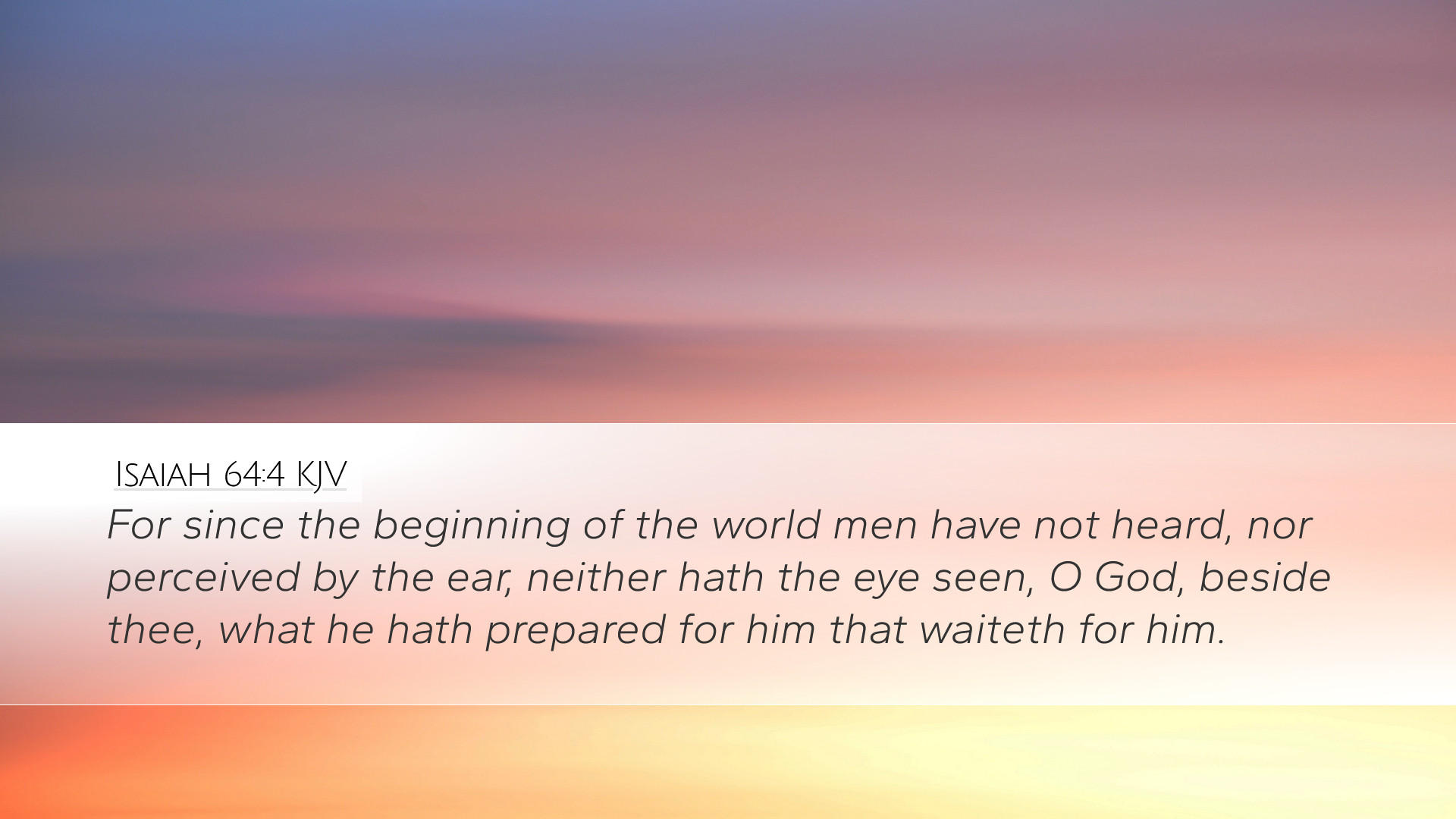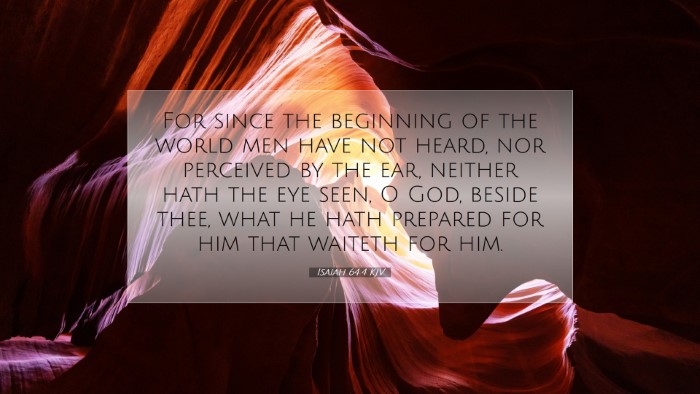Commentary on Isaiah 64:4
Verse: "For since the beginning of the world men have not heard, nor perceived by the ear, neither hath the eye seen, O God, beside thee, what he hath prepared for him that waiteth for him."
Introduction
This verse from Isaiah encapsulates the profound mystery of God's plans and the futility of human understanding without divine revelation. It points to a special relationship between God and those who wait upon Him, suggesting that true blessedness is reserved for those who await God's promises. This commentary combines insights from several public domain sources to provide depth and understanding to this important passage.
Exegesis and Insights
The verse is a grand declaration of the uniqueness of God’s dealings with humanity, especially those who express faith and patience.
Understanding the Context
Isaiah 64 sits within a larger discourse where the prophet calls for God’s intervention amidst the people’s distress and sin. The preceding chapters detail Israel’s failings and their longing for salvation. This verse, therefore, is both a plea and a promise, emphasizing that God's plans surpass human comprehension.
Breakdown of the Verse
- "For since the beginning of the world..."
This phrase indicates the timeless nature of God’s wisdom and plans. Biblical history and human experiences through the ages cannot compare to what God has prepared.
- "men have not heard, nor perceived by the ear..."
Henry underscores that although natural revelation is evident, the fullness of God's glory and intentions are beyond what can be heard or understood by senses alone.
- "neither hath the eye seen..."
This metaphor suggests that physical sight is inadequate to grasp divine truths. Clarke elaborates on the limitations of human perception regarding spiritual realities.
- "O God, beside thee, what he hath prepared..."
There is an exclusivity in God’s plans for those who wait on Him, revealing that anticipation and expectation in faith yield divine blessings.
- "for him that waiteth for him."
This indicates a promise to those who are patient and faithfully expectant. Barnes notes that waiting suggests hope and trust in God's timing and provision.
Theological Implications
The implications of Isaiah 64:4 extend into both theology and practical application:
- God's Sovereignty:
God’s plans are sovereign and beyond human assessment. The fact that these plans involve our waiting reflects His authority and wisdom.
- Human Limitations:
This verse reminds us of the limitations of human reasoning. Clarke emphasizes the necessity of divine revelation to understand God’s intentions.
- ESchatological Hope:
The awaiting mentioned points to eschatological themes, revealing that God's ultimate plan encompasses fullness and completion in eternity.
- Spiritual Discernment:
As believers, there is an inherent need for spiritual discernment to grasp God’s preparations. This relationship is cultivated through seeking Him earnestly.
Practical Applications
In light of this profound verse, several practical applications emerge for pastors and theologians:
- Encouragement in Waiting:
Encourage congregants to embrace waiting as an active spiritual endeavor. Emphasize that waiting is not passive but filled with anticipation and faith.
- Promoting Trust in God’s Plan:
Stress that while circumstances may appear dismal, God's hand is at work, preparing something far beyond human understanding.
- Teaching on Revelation:
Address the importance of revelation in understanding God’s purpose. Encourage a deeper engagement with scripture and prayer to discern His will.
- Spiritual Growth through Expectation:
Foster a culture of expectant faith within communities, teaching that God delights in revealing His plans to those who earnestly seek Him.
Conclusion
Isaiah 64:4 serves as a profound reminder of the importance of waiting upon God and recognizing the limitations of human understanding when juxtaposed with the magnificence of divine revelation. By reflecting on this verse, we are drawn not only to recognize God's sovereignty but also to anchor our lives in faith, expectation, and a deepening relationship with Him.


